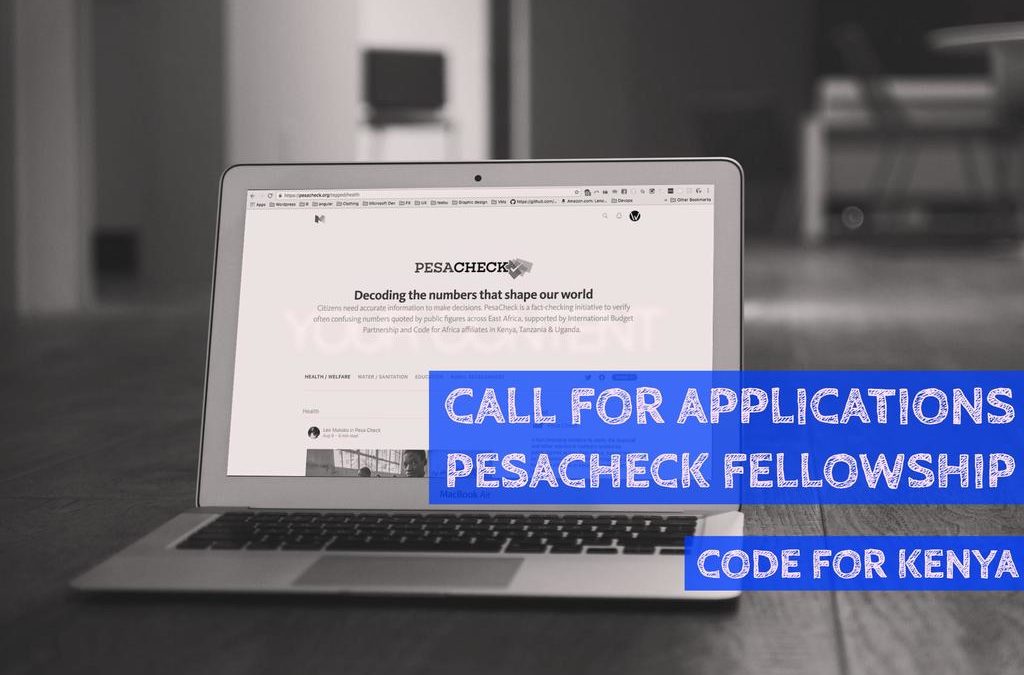Do you want to be a public watchdog, and help hold people in power to account? Are you interested in explaining important health and development issues to ordinary Kenyans?
Come join East Africa’s first indigenous fact-checking initiative.
Code for Kenya is sponsoring a one-year part-time Fellowship for an outstanding individual who will join the PesaCheck team, to help research and fact-check public statements by public figures to ensure that they’re giving citizens accurate and actionable information.
Why is this important?
Politicians, corporate leaders and even journalists get away with scores of ‘white lies’ every day, simply because there isn’t anyone to systematically fact-check their claims against the ‘hard, cold evidence’. The lies range from small mistakes, where they simply get the numbers wrong, to bigger and more deliberate distortions involving exaggeration or deliberate misinformation.
The result? Life and death decisions by government planners and by the general public are often made based on dodgy information. What types of decisions, you ask? Everything from where to build the next hospital, to whether a community needs water infrastructure rather than schools.
If we want better public services, we need better information. Why? So we can all make better informed decisions.
What will the PesaCheck Fellow do?
The PesaCheck Fellow will tap expertise at Kenya’s leading think tanks, academia and research institutions to produce a weekly data-driven fact-checking article that catches the ‘white lies’ that distort so much of our public debate. Because our work focuses on empowering ordinary citizens, the Fellow’s work will specifically shine a light on health and development issues. The fact-checking articles will be syndicated into mainstream Kenyan media, as well as onto appropriate blogs and online media.
The successful candidate will:
- Have good research and interviewing skills.
- Have strong verbal and written communication skills.
- Be a ‘digital native’, who knows there way around the online world.
- Be able to comprehend and explain complex societal issues to ordinary citizens.
- Be able to ‘think visually’ to help explain complex issues using visualisation. The Fellow will work with a graphics team, but any ability to design visualisations will be an added advantage.
- Be adaptable, self-motivated and able to work in a fast-paced, deadline-driven environment.
- Be objective, impartial and avoid spin. All analysis must be evidence-based.
You should:
- Have at least five years experience as a journalist or analyst.
- Be prepared to undergo a roleplay evaluation during the interview process (meaning: do some fact-checking).
- Have your own laptop.
The position is a part-time Fellowship, with the prospect to become a full-time role. The successful candidate will receive a modest monthly stipend, and will work under supervision of the PesaCheck team at Code for Kenya’s CivicLab at the Nairobi Garage, at Piedmont Plaza, on Ngong Road, Nairobi.
The deadline for applications is January 6, 2017.
How to apply:
Please apply by sending an email to the recruitment team at fellowships@pesacheck.org with your cover letter and CV.
Please include the following in your subject line: PesaCheck Kenya Fellowship.If you do not hear from us within two weeks after the application deadline, please consider your application unsuccessful.
About: PesaCheck
Citizens need accurate information to make decisions. PesaCheck is East Africa’s first indigenous fact-checking initiative to verify the often confusing facts and figures quoted by public figures across the region. PesaCheck runs fact-checking fellowships in Kenya, Tanzania & Uganda in partnership with local media. PesaCheck is incubated by Code for Kenya, with support from the International Budget Partnership and Twaweza.
About: Code for Kenya
Code for Kenya is a member of the Code for Africa (CfAfrica) federation, the continent’s largest independent data journalism and civic technology initiative. CfAfrica runs the $1 million per year innovateAFRICA.fund, the $500,000/year impactAFRICA.fund and the $500,000/year Sandbox Fund which award seed grants to civic pioneers for experiments with everything from camera drones and environmental sensors, to encryption for whistleblowers and data-driven semantic analysis tools for investigative watchdogs.
Code for Kenya seeks to leverage these resources and technology tools to build digital democracies that give citizens timely and unfettered access to actionable information that empowers them to make informed decisions and strengthens civic engagement. A major focus of this work is to strengthen watchdog journalism by providing digital tools, data, and editorial support.

I realized the deadline for the watchdog has passed. However I wish to know how a “Mashinani” project like ours Slums Information Development and Resource Centers(SIDAREC)can work with Code Africa. We are a community communications Organization with resource centers and citizens journalist(barefoot)audit groups for devolved funds. We use our Ghetto FM radio and a network of other community radios around the country. I will gladly wish to know how you can validate our grassroots level work and help us to scale. One of our centers is a technology hub for youth women and children. Hope you can respond.